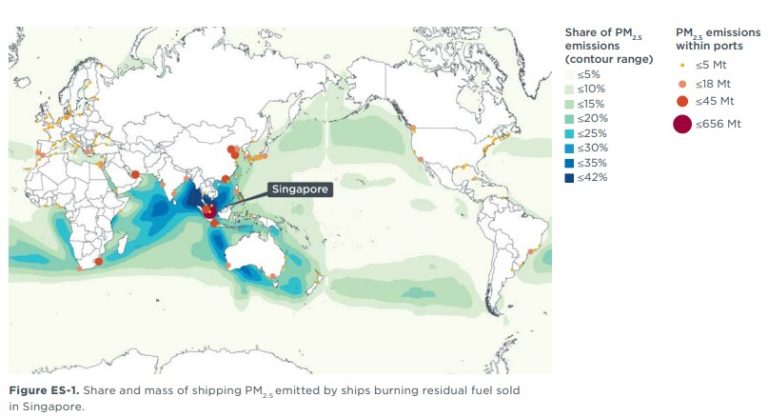You are here
White paper finds more than 40% of Southeast Asia’s shipping pollution linked to Singapore bunker sales
White paper finds more than 40% of Southeast Asia’s shipping pollution linked to Singapore bunker sales
Adis Ajdin July 20, 2022 https://splash247.com/white-paper-finds-more-than-40-of-southeast-asias-...
Washington-based independent nonprofit organisation the International Council on Clean Transportation (ICCT), has published a white paper on greenhouse gas (GHG) air and water pollution linked to marine fuel sales at the Port of Singapore.
The study claimed that if the world’s largest bunkering hub, which accounted for one-fifth of reported marine fuel sales globally in 2019, was accounted for GHG emissions associated with the residual fuel it sells, its total emissions impact would be four times higher than its national inventory, resulting in increased emissions per capita to six times the global average.
The paper, written by Xiaoli Mao, Dan Rutherford, Liudmila Osipova and Elise Georgeff, found that Singapore’s marine fuel sales exert a global environmental footprint, but much of the pollution is concentrated in the seas and coastal areas neighbouring the country.
In the seas surrounding Southeast Asia, marine residual fuel sold in Singapore is said to account for more than 42% of all shipping particulate matter (PM)2.5. Hot spots are also seen in the South China Sea, the Indian Ocean, and throughout Oceania, including along the western and southern coasts of Australia.
The authors noted that Singapore ranks low in terms of absolute emissions due to the small size of its exclusive economic zone (EEZ), but high in terms of the relative contributions of PM2.5 (35%) and NOx (29%) from ships burning residual fuel bunkered in Singapore. Neighbouring countries, including Malaysia (37% of shipping PM2.5), Vietnam (30%), Sri Lanka (25%), Indonesia (23%), and India (22%), are also said to be heavily impacted by Singapore marine fuel sales.
The paper also stressed that Singapore’s marine fuel sales contribute even more heavily to scrubber washwater discharges than for PM2.5 and NOx. “For the most heavily impacted regions – Vietnam, Malaysia, Sri Lanka, India, China, and Singapore itself – marine fuel bunkered in Singapore is said to be responsible for at least 40% of all scrubber discharges in their EEZs despite scrubber washwater discharge bans in some countries,” it said.
ICCT findings suggest that a better understanding of pollution from marine fuels bunkered in Singapore is needed, given its central role in fossil fuel bunkering, the associated air and GHG pollution from those fuels, and the large public health impacts of shipping air pollution in Asia.
It further highlighted that in order to remain an important bunkering port, Singapore would need to ramp up efforts to supply renewable fuels, consider additional efforts to transition away from fossil bunkering and reconsider any further investments in liquefied natural gas (LNG).
“Integrating shipping into Singapore’s domestic GHG inventory and Nationally Determined Contribution would further demonstrate the country’s commitment to decarbonising its marine fuel sales,” the report noted.

